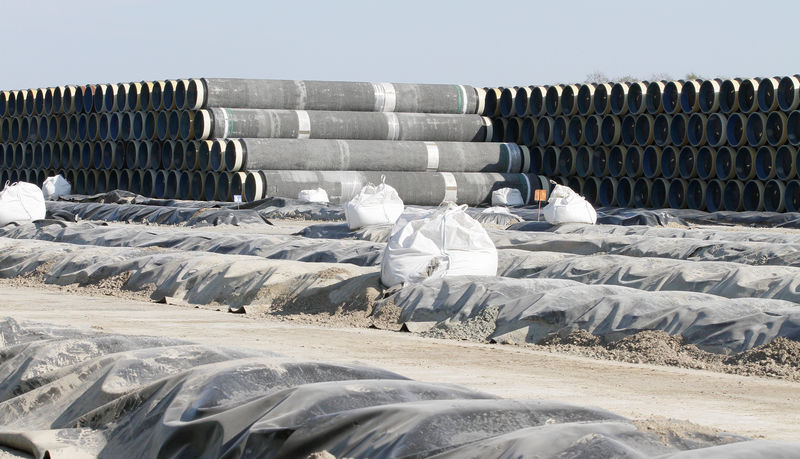BRUSSELS (Reuters) - European Union nations backed a plan to regulate Russia's Nord Stream 2 pipeline on Friday, a move that will likely slow but not rule out its construction.
The long-stalled agreement comes after a last-ditch German and French push to amend the draft and give Berlin a greater say in how to ensure the pipeline to carry Russian gas to Europe under the Baltic Sea complies with EU law.
Chancellor Angela Merkel hailed the vote as an example of Berlin's close ties with Paris after the two major European powers, which both have firms invested in the project, were publicly at odds ahead of the EU meeting.
Nord Stream 2 has divided the EU, with German opposition to the new draft rules stalling discussions since it was proposed by the EU executive in November 2017.
Eastern European, Nordic and Baltic Sea countries see the 1,225 km (760 mile) pipeline increasing EU reliance on Moscow, while those in northern Europe, especially Germany, prioritise the economic benefits.
EU capitals overcame difference on Friday over shared geopolitical concerns that it would deprive Ukraine of transit fees that are a lifeline of its economy by doubling the amount of gas that could be pumped under the Baltic Sea.
Such worries have driven fierce U.S. lobbying against the Russian project.
A French official rejected suggestions that Washington's threat to sanction the project led EU nations to break their deadlock. "We don't make decisions based on U.S. bravado," the official said.
The draft law will likely require a change in business model for the project, led by Russian state energy firm Gazprom (MCX:GAZP) in partnership with five Western firms - Germany's Uniper and BASF's Wintershall unit, Anglo-Dutch firm Shell (LON:RDSa), Austria's OMV and France's Engie.
It calls for all import pipelines to meet EU energy market rules by not being directly owned by gas suppliers; applying non-discriminatory tariffs and transparent reporting; and allowing at least 10 percent of capacity to be made available to third parties.
Berlin worked overnight with Paris to amend the proposed bill when it became clear that it had lost its blocking minority among the 28 nations. The last-minute changes give it greater say because the pipeline would connect with the European gas grid in Germany.
EU sources say Berlin may now seek an exemption from the bloc's energy rules, or it may cut a deal with Moscow over how the pipeline is operated, subject to review by the EU executive.
The details of the proposal may still shift in talks next week between the EU's three lawmaking institutions to agree the final rules.
If adopted, EU diplomats say the rules will not stop the pipeline but are likely to make its completion more costly and lengthy.
BUSINESS VS GEOPOLITICS
The pipeline plan has become increasingly controversial since Russia's annexation of Ukraine's Crimea in 2014.
In an effort to address concerns, Merkel has insisted that gas volumes must continue via Ukraine - the traditional route for supplies that make up over a third of the EU's gas needs.
So far EU-mediated talks between Russia and Ukraine have failed to agree the terms of such transits before their current contract expires by year's end.
Any delay to Gazprom's push to complete construction of Nord Stream 2 in 2019 could weaken Moscow's hand in those negotiations.
Western firms invested in the project have so far each financed 600 million euros (£526 million) until year's end in what they say is a sign of faith that it will be continued, sources familiar with the matter said.
"It would be fatal, if a fully approved billion-euro project, in which billions have been invested, could suddenly no longer be carried out," OMV CEO Rainer Seele said earlier this week. "That wouldn’t necessarily strengthen investor confidence in Europe."
EU imports of Russian gas : http://tmsnrt.rs/2nz1ySg

(This story corrects to say firms have each invested €600 million, adds sourcing, paragraph 19)